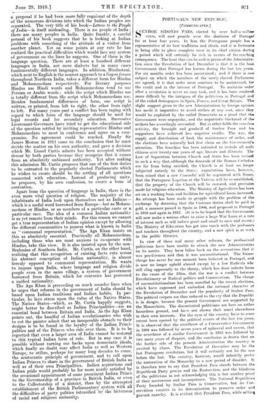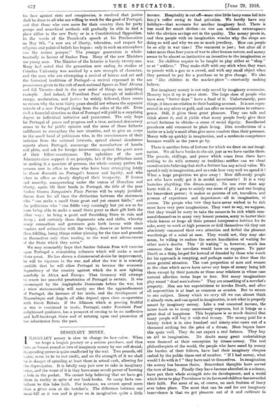S ENHOR SIDONIO PARS, elected by over half-a-millian votes, will now
preside over the destinies of Portugal for at least four years. In him the Portuguese people has representative of its best traditions and ideals, and it is fortunate in being able to place complete trust in its chief citizen during a period which will certainly be rich in events of far-reaching consequence. The least that can be said in praise of the Administra- tion since the Revolution of last December is that it. is the best Government that Portugal has known during the last ten years. For six months order has been maintained ; and if there is one subject on which the members of the newly elected Parliament are agreed, it is that order must continue to be maintained, for the credit and in the interest of Portugal. To maintain order after a revolution is never an easy task, and it has been rendered more difficult by the intrigues of the politicians in Portugal and of the exiled demagogues in Spain, France, and Great Britain. The slight support given to the new Administration by foreign opinion has made it imperative to avoid strikes at any cost, since they would be exploited by the exiled Democrats as a proof that the Government were unpopular, and the unpatriotic blackmail of the strikers has accordingly succeeded. But in other fields the ceaseless activity, the foresight and goodwill of Senhor Paes and his supporters have achieved less negative results. The war, the supply and distribution of food, the maintenance of order, and the elections have naturally had first claim on the Government's attention. The franchise has been extended to include all male citizens over twenty-one years of age, literate and illiterate. The Law of Separation between C'hurch and State has been revised in such a way that, although the demands of the Roman Catholics are far from being satisfied, the Church is at least no longer subjected entirely to the State ; expectations have, however. been raised that a new Concordat will be negotiated with Rome. that the Portuguese Legation at tho Vatican will be re-established, that the property of the Church will be restored, and provision made for religious education. The Ministry of Agriculture has been set on a working basis and facilities for agricultural loans increased. An attempt has been made to grapple with the problem of the exchange by decreeing that the Customs duties shall be paid in gold, a measure passed in Spain in 1906, and proposed in Portugal in 1910 and again in 1912. (It is to be hoped that the Government will now make a serious effort to raise a large War Loan at a rate of interest such as will induce great and small to save and invest.) The Ministry of Education has got into touch with the professors and teachers throughout the country, and a new spirit is at work in the public libraries.
In view of these and many other reforms, the professional politicians have been unable to attack the new Administration on its merits. They have fallen back on the accusations that it was pro-German and that it was unconstitutional. The formes charge has never for one moment been believed in Portugal, and is now no longer upheld abroad except by a few Radicals whe still cling apparently to the theory, which has done infinite harm to the cause of the Allies, that the war is a conflict between Revolutionary or Radical politics and Conservatism. The charge of unconstitutionalism has been annulled by the recent elections, which have expressed and embodied the national character of the Revolution of December and the popularity of Senhor Pees. The political carper; are thus reduced to the cry that the Republic is in danger, because the present Government are supported by the Monarchists. The discontented politicians are here on rather hazardous ground, and have not shown their usual shrewdness in their own interests. For the eyes of the country have to some extent been opened by the political events of the last ten years. It is observed that the overthrow of a Conservative Government, in 1908 was followed by seven years of upheaval and unrest, that the overthrow of a similar Government in 1915 was followed by two more years of disquiet, and the conclusion is drawn that on the further side of the present Administration the country is awaited by chaos. The Revolution of December may be the last Portuguese revolution, but it will certainly not be the one before the last. The country, however, would infinitely prefer the restoration of the Monarchy to a new period of disorder. It is therefore true to say that President Pace stands between the Republican Party groups and the Restoration, and the blindness of the politicians in not acknowledging this is but another proof of their narrowness and incompetence. The National Republican Party founded by Seedier Paes is Conservative, but its Con- servatism consists in its determination to preserve order and prevent anarchy. It is evident that President Pace, while setting
his face against riots and conspiracies, is resolved that justice shall be done to all who are willing to work for the good of Portugal, and that those who care more for their country than for party groups and anarchical methods will gradually be able to find a place either in the new Party or in a Constitutional Opposition. In the words of the President's speech at his Proclamation on May 9th, " a new era of liberty, toleration, and respect for religious and political beliefs has begun : only in such an atmosphere can the nation prosper." The younger generation is whole- heartedly in favour of Senhor Pam Many of the new Ministers are young men. The Minister of the Interior is barely twenty-one. Many had noted that the generation now ending its studies at Coimbra University was marked by a new strength of character, and the men who are attempting a revival of letters and art and the historical traditions of Portugal—a revival expressed in the prominence given to the cult of such national figures as Nun' Alvarez and Gil Vicente—find in the new order of things an inspiriting example. And indeed, if President Paes' example of individual energy, moderation, and justice be widely followed, there seems no reason why the next thirty years should not witness the apparent miracle of a new Portugal rising from the ashes of the old. Even such a financial situation as that of Portugal will yield in a surprising degree to individual initiative and persistence. The only hope for Portugal of peace and progress and a true, national democracy seems to be for public opinion and the mass of those hitherto indifferent to strengthen the new situation, and to give no scope to the small band of politicians who, in the consciousness of their isolation from the national interests, spread abroad slanderous reports about Portugal, encourage the manufacture of bombs and plots, and ask for foreign intervention against the great mass pf their fellow-countrymen. The upholders of the new Administration support it on principle, but if the politicians insist on making it a question of persons, the whole country prefers the persons now in office to those who have been attempting lately to throw discredit on Portugal's honour and loyalty, and who when in office so clearly displayed their incapacity. If licence and anarchy, masquerading under the names of liberalism and liberty, again lift their heads in Portugal, the title of the poet :$enhor Guerra Junqueiro's Finis Patrice will be amply justified. Bacon drew for all time the distinction between the statesman who " can make a small State great and yet cannot fiddle," and he politicians who " can fiddle very cunningly but yet are so far from being able to make a small State great as their gift lieth the other way : to bring a great and flourishing State to ruin and decay ; and certainly those degenerate arts and shift% whereby many counsellors and governors gain both favour with their alas:teas and estimation with the vulgar, deserve no better name than fiddling, being things rathey pleasing for the time and graceful to themselves only than tending to the weal and advancement of the State which they serve."
We may reasonably hope that Senhor Sidonio Pees will exercise upon Portugal a stimulating influence which will make a small State great. He has shown a disinterested.desire for improvement, lie will be vigorous in the war, and after the war it is scarcely arealible that he will allow Portugal to become the economic dependency of the country against which she is now fighting manfully in Africa and Europe. That Germany will attempt to renew her peaceful penetration of Portugal is certain. It was encouraged by the Anglophobe Democrats before the war, but a wiser statesmanship will surely see that the aggrandisement of Portugal, the increase of her trade, and the development of Mozambique and Angola all alike depend upon close co-operation with Great Britain. If the Alliance which is proving fruitful in war is continued in trade, Portugal, under President Paes' enlightened guidance, has a prospect of ceasing to be an ineffective and half-bankrupt State and of entering upon real possession of her inheritance from the past.



























 Previous page
Previous page